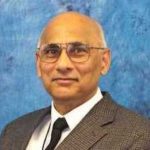
Congratulations to Rathindra (Babu) DasGupta, senior scientist, who on Dec. 21 will receive an award from the Republic of Korea (South Korea) in recognition of outstanding contributions to the community. The award—Technology Commercialization of Public Research Achievements—will be given by the minister of science and ICT (Information and Communication Technology) in recognition of DasGupta’s continuing work on innovation and entrepreneurship as well as having worked with Korea to implement the Lean Startup methodology. The Korean Lean Start Innovation project was established in South Korea in 2015; since then, 223 teams have completed education and 120 laboratory start-ups have been established.
DasGupta has worked as an independent consultant since 2016 and has promoted industry-academic partnerships and innovation in various organizations and universities.
DasGupta supports faculty, staff funding efforts at UWM’s College of Engineering & Applied Science
DasGupta—who worked for years at the National Science Foundation as a program director and helped establish the national I-Corps Program—joined the college’s Office of Research Support in 2018. He assists faculty with their research funding and fosters industry-academic partnerships and entrepreneurship for faculty and students.
Recently, for example, he helped Mohammad “Habib” Rahman, associate professor, biomedical and mechanical engineering, prepare and review his proposal (“Multifunctional Robotic Assistive Arm (mR2A) for Activities of Daily Living Assistance”) for the National Institute on Disability, Independent Living, and Rehabilitation Research. In September, Rahman was awarded a $1.49 million grant from the federal agency.
He also assisted Konstantin Sobolev, professor, civil and environmental engineering, in preparing an NSF RAPID grant proposal to design and test superhydrophobic and photocatalytic antimicrobial (SPA) coatings that could be applied to surfaces to both repel and deactivate virus-laden droplets. In April, Sobolev’s four-person UWM team received a $198,326 NSF COVID-19 RAPID grant.
In 2018, DasGupta mentored Rahman in the NSF I-Corps program. The lessons learned from the I-Corps customer discovery process, DasGupta said, have led Rahman to prepare and submit proposals to federal agencies to fund proof-of-concept work and prototype development for the mobile robotic arm.